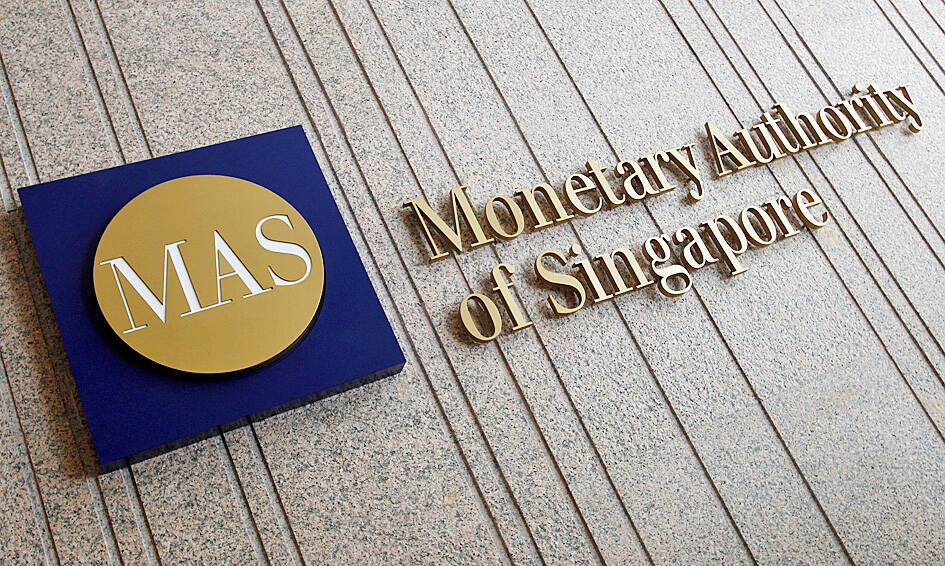Citigroup Inc, DBS Group Holdings Ltd and other banks caught up in Singapore’s biggest money-laundering scandal are ramping up scrutiny of their wealthy customers and potential clients to avoid exposure to illicit flows, people familiar with the matter said.
Private bankers at several institutions are also receiving additional training to help them spot tricks used by criminals to mask their backgrounds and sources of funds, the people said.
The moves, which are voluntary, show how lenders are trying to close loopholes that enabled a group of criminals from China to launder more than S$3 billion (US$2.22 billion) in proceeds from online gambling through at least 16 financial institutions in the island nation.

Photo: Edgar Su, Reuters
The scandal has tarnished Singapore’s image and exposed weaknesses in how local and foreign banks and brokerages screen their clients.
The Monetary Authority of Singapore (MAS) recently completed on-site inspections of some banks that were involved in the case.
Lenders that had the most dealings with the criminals — through deposit accounts, loans and other financial services — are expected to face fines and other punitive measures from the financial regulator after its review concludes, some of the people said.
The MAS would assess if the financial institutions have implemented adequate and appropriate controls against money laundering and terrorism financing, and would take action if they have fallen short of requirements, as it has done in past cases, a MAS spokesperson said in response to questions from Bloomberg News.
Supervisory engagements are ongoing, the spokesperson said.
After the laundering case became public in August last year, Singapore’s government set up an inter-ministerial committee to review its anti-money laundering regime and strengthen defenses in sectors including financial institutions, property agents and precious metals dealers.
The assets seized by authorities included cash, gold bars, jewelry, cars, and residential and commercial properties.
The 10 accused have pleaded guilty, and have been sentenced to prison for 13 to 17 months. Another 17 people are under investigation and remain at large.
The 10 convicted individuals were linked to accounts across 16 financial institutions operating in Singapore that held more than S$370 million in deposits and investments.
The banks that held the most assets include Credit Suisse Group AG, Citigroup’s local unit and United Overseas Bank Ltd.
DBS is also among banks tightening their processes for vetting major transactions by clients, the people said.
The country’s largest bank had about S$100 million in exposure, mainly from financing property purchases.
Anti-money laundering processes are evolving to keep up with changes in how criminals act, as well as regulatory and industry developments, a DBS spokesperson said.
“Criminals will adapt their behavior now that there has been discovery of their methods, so we will need to continue thinking about how to stay one step ahead,” the DBS spokesperson added.

When an apartment comes up for rent in Germany’s big cities, hundreds of prospective tenants often queue down the street to view it, but the acute shortage of affordable housing is getting scant attention ahead of today’s snap general election. “Housing is one of the main problems for people, but nobody talks about it, nobody takes it seriously,” said Andreas Ibel, president of Build Europe, an association representing housing developers. Migration and the sluggish economy top the list of voters’ concerns, but analysts say housing policy fails to break through as returns on investment take time to register, making the

EARLY TALKS: Measures under consideration include convincing allies to match US curbs, further restricting exports of AI chips or GPUs, and blocking Chinese investments US President Donald Trump’s administration is sketching out tougher versions of US semiconductor curbs and pressuring key allies to escalate their restrictions on China’s chip industry, an early indication the new US president plans to expand efforts that began under former US president Joe Biden to limit Beijing’s technological prowess. Trump officials recently met with their Japanese and Dutch counterparts about restricting Tokyo Electron Ltd and ASML Holding NV engineers from maintaining semiconductor gear in China, people familiar with the matter said. The aim, which was also a priority for Biden, is to see key allies match China curbs the US

NOT TO WORRY: Some people are concerned funds might continue moving out of the country, but the central bank said financial account outflows are not unusual in Taiwan Taiwan’s outbound investments hit a new high last year due to investments made by contract chipmaker Taiwan Semiconductor Manufacturing Co (TSMC, 台積電) and other major manufacturers to boost global expansion, the central bank said on Thursday. The net increase in outbound investments last year reached a record US$21.05 billion, while the net increase in outbound investments by Taiwanese residents reached a record US$31.98 billion, central bank data showed. Chen Fei-wen (陳斐紋), deputy director of the central bank’s Department of Economic Research, said the increase was largely due to TSMC’s efforts to expand production in the US and Japan. Investments by Vanguard International

Berkshire Hathaway Inc is looking to increase ownership in Japan’s five largest trading houses “over time,” company chairman and CEO Warren Buffett said in an annual letter to shareholders. The conglomerate had originally agreed to keep its holdings in the companies below 10 percent. However, the trading houses have agreed to relax the ceiling “moderately,” as Berkshire approaches the limit, a letter dated on Saturday said. The shares of the five — Mitsubishi Corp, Mitsui & Co, Itochu Corp, Sumitomo Corp and Marubeni Corp — have benefited over the longer-term from Buffett’s interest. However, they have struggled in recent months, along with